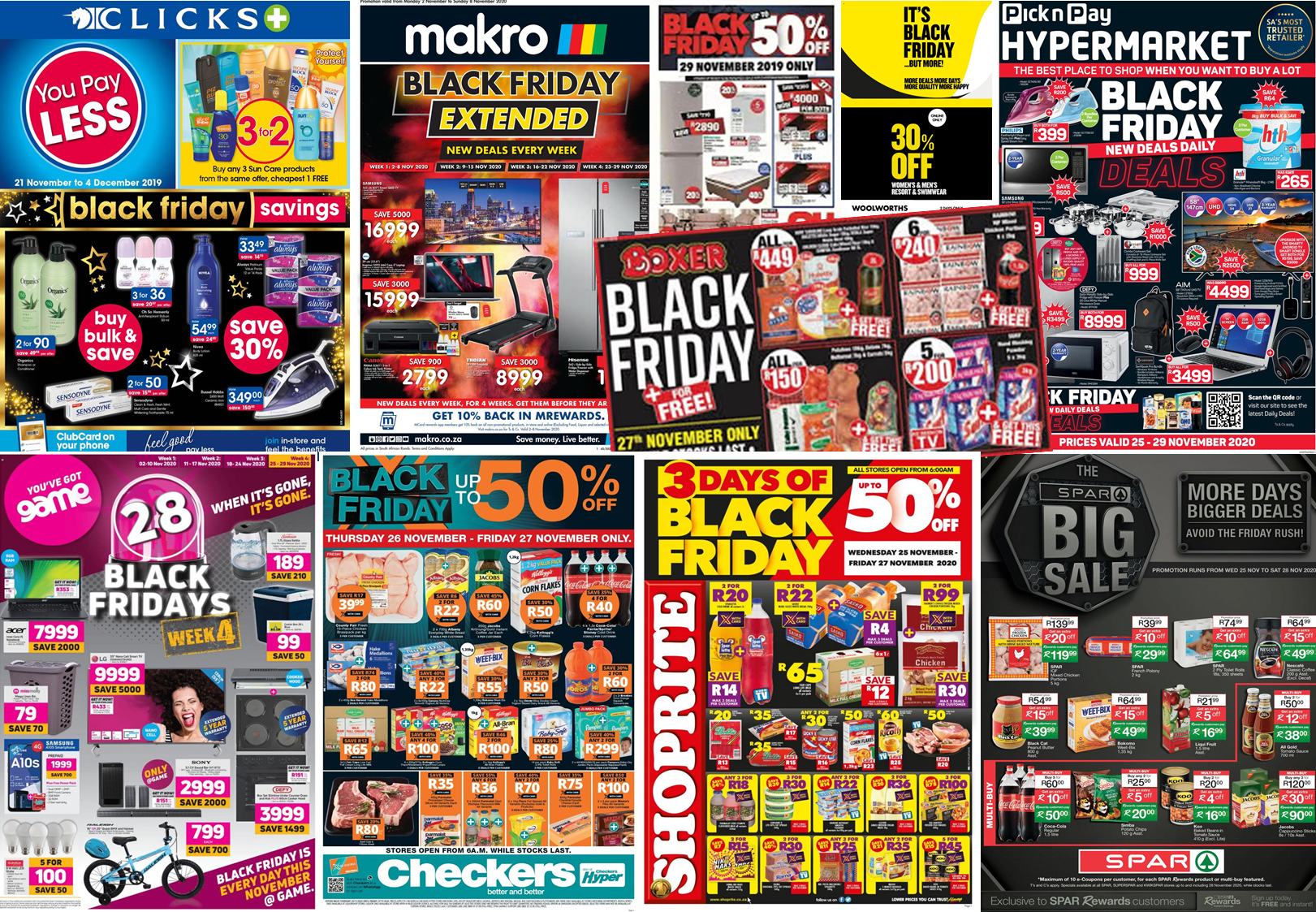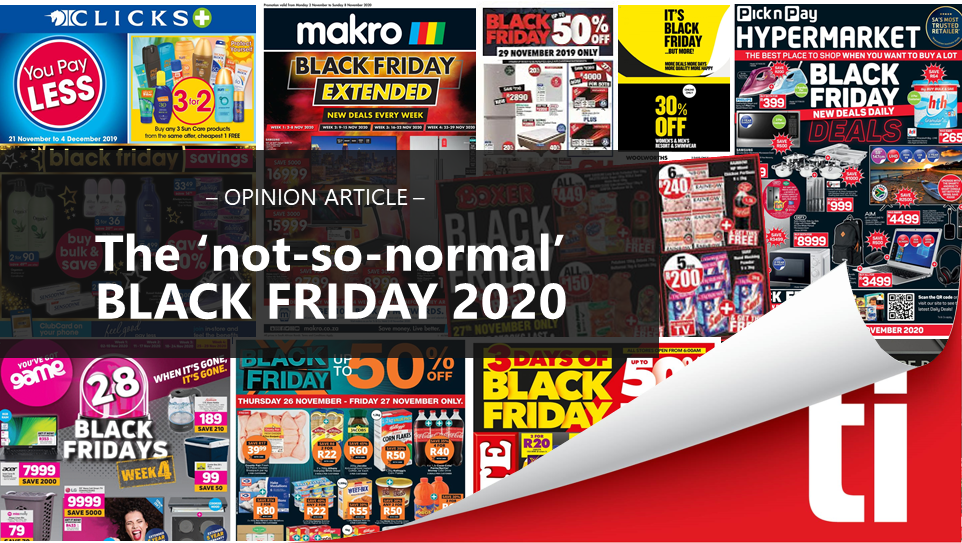The concept of Black Friday originated in the USA in the 1960s, falling on the day after Thanksgiving and marks the start of the festive shopping season. Black Friday gained its name to reflect sales so high that revenue moved from red (loss) to black (profit). The occasion started gaining traction in South Africa in 2012 when online retailer Takealot first took a stab at the promotional event, followed by Checkers as the first in-store retailer to run the promotion in 2014.
During 2020, the disruptions caused by the COVID-19 pandemic affected consumers’ expectation and retailers’ participation in Black Friday. Retailers had to adjust their strategies to ensure continued participation in the Black Friday promotional period, thereby also meeting the shopper’s need for value promotions in the midst of a global pandemic.
2020 Black Friday results: Early indicators
While the jury is still out on the overall performance of Black Friday 2020, varied results reflect the challenging and uncertain nature of trading within a disrupted retail landscape:
- Sales were drastically down from 2019, with total transaction volumes -33% and value -52% year-on-year over the Black Friday weekend*
- Retailers observed approximately two million fewer transactions on Black Friday 2020 than during 2019**
- In-store card purchases on 27 November were just under five million – a -30% decrease from 2019**
Small businesses reported good Black Friday sales, with the number of card transaction increasing by +46% compared to a Friday following pay day***
- Online transactions were up more than +60%**
[Sources: *Sasha Planting at Dailymaverick, **businessinsider.co.za, ***businesslive.co.za]
Although these numbers give some indication of the performance of Black Friday 2020, the true measure of success (or failure) will be reflected in retailers’ consolidated sales figures for the extended promotional periods, including all in-store and online sales.
Planning for Black Friday 2020
Planning for Black Friday 2020 was no doubt a challenge for retailers. Promotional strategies were crafted with uncertainty about the full impact and scope of the disruptions of COVID-19 on the economy and on the retail landscape, as well as taking into account the need to prioritise shopper safety.
Retailer considerations included:
- Aligning promotions with changing shopper needs
Shopper needs and preferences are influenced by the economic climate and market trends. The impact of COVID-19 on the economy amplified pressure on consumer disposable income and thus purchasing decisions. Value is no longer a lower-income priority, but a necessity for all South Africans. This shifted the emphasis of Black Friday from self-indulgent shopping to a vehicle for offering South African consumers the opportunity to stock up on basic household necessities.
- Prioritising safe shopping and social distancing
To prevent a shopping frenzy resulting in congested stores and queues of shoppers snaking through malls, retailers had to consider tactics in support of social distancing. Extended promotional periods and an increased focus on e-commerce were key strategies employed to promote safe shopping in 2020.
2020 Black Friday trends
>> E-commerce accelerated
While South Africans were previously slow to adopt online shopping, the COVID-19 pandemic accelerated their acceptance of online shopping out of a necessity for convenience and safer shopping.

*Source: Nielsen's Connected Commerce, Shopper Trends, and COVID-19 syndicated surveys (April 2020)
According to Business Insider, online transactions increased by more than +60% during Black Friday. With consumers’ confidence established in the use of online earlier in the year because of the pandemic, consumers were more willing to use online platforms to make purchases over Black Friday instead of going in store and standing in long queues.

**Source: Business Insider https://www.businessinsider.co.za/black-friday-2020-statistics-for-sa-show-a-big-transaction-fall-2020-
>> Black November
Many retailers offered extended Black Friday deals over the month of November, allowing shoppers to participate and buy goods over a longer period than the traditional one day or weekend-long Black Friday event. This extension therefore supported social distancing in store, in adherence with COVID-19 safety protocols. It also created inclusivity for all shoppers and their different monthly pay days and social grant payment days – all shoppers where catered for throughout the month.
>> A season of promotions, pre-Black Friday
The economic pressures induced by the COVID-19 pandemic put further strain on already cash-strapped South African shoppers’ disposable income. Retailers responded to shoppers’ need for value through regular value promotions, from the onset of the initial lockdown, throughout the rest of the year leading up to Black Friday. While fewer value promotions were featured prior to Black Friday in previous years, during 2020 shoppers had access to regular value promotions leading up to the event. This may likely have muted shopper response to the Black Friday promotions, which in many cases resembled the discounts they had become accustomed to.
Retailers’ approach to Black Friday 2020


Massmart offered an extended four-week Black Friday in the month of November offering new specials weekly. In store and online, the deals included a variety of electronic and home goods. Game and Makro ran their Black Friday deals from 2 – 29 November.

Pick n Pay started early Black Friday deals on Friday, 13 November – a two-week Black Friday blow-out that offered up to 50% off a variety of products including grocery and appliances. Daily online exclusive deals were also offered prior to 13 November.
- Daily deals lasted until the 26 November
- Smart Shopper/Price deals lasted until the 29 November
Pick n Pay extended its initial Black Friday, which was scheduled to end on the 29 November, to 6 December to allow SASSA grant recipients a chance to participate and purchase Black Friday deals as their payments are released between the 1st and 5th of the month.

Nationally, SPAR coined its Black Friday promotion ‘The SPAR Big Sale’, including daily deals to avoid the Friday rush and assist shoppers’ ability to shop while remaining socially distanced. These deals were exclusive to SPAR rewards customers. The promotion ran from 25 – 28 November.
While Black Friday promotions were limited to individual franchise store promotions up until 2018, SPAR opted for a national Black Friday promotional offering this year, where franchise stores selected products according to their ranging from ‘The SPAR Big Sale’ advertised products.

Shoprite did Black Friday differently this year with the launch of the Shoprite Xtra Savings reward programme in October taking priority. This rewards programme is designed to benefit shoppers with instant cash saving needs and shoppers can receive discounts of up to 40% off on everyday essentials.
Shoprite & Checkers included Black Friday deals and discounts of up to 50% on everyday essentials through their Xtra Savings reward programme.

Woolworths surprised everyone with its first online only Black Friday deals that ran from 26 – 27 October 2020, a month ahead of Black Friday. This enabled the retailer to capitalise on October’s pay day and provide shoppers a safe and convenient way to shop. Further, Woolworths Black Friday deals where valid from 23 November – 6 December 2020 available instore and online. Deals covered a range of products from fashion to beauty, food, and home

Clicks Black Friday promotions started on 26 November and ended on 2 December 2020 both online and in store, with some deals exclusive to online. Deals were offered across categories, which included home appliances, electrical haircare, skincare, fragrances, makeup and baby.
From 18 – 25 November leading up to Black Friday, shoppers could get early access to Clicks ‘Amazing Black Friday’ online-only daily deals through their ‘why wait for Black Friday’ promotions.
Conclusion
Notwithstanding the COVID-19 pandemic, it is safe to say that Black Friday is here to stay – starting off and ending with a resounding bang for South African shoppers.
Retailers pulled out all the stops in 2020, listening and never failing to protect the health and safety of all shoppers through limitations on the number of customers in store and amplified online presence and offerings. South African retailers understood shoppers’ needs, considered their shoppers’ varying levels of affordability, and provided a range/variety of products while still offering much-needed value. We look forward to Black Friday 2021 and all it has to offer.
Please read the full article HERE






